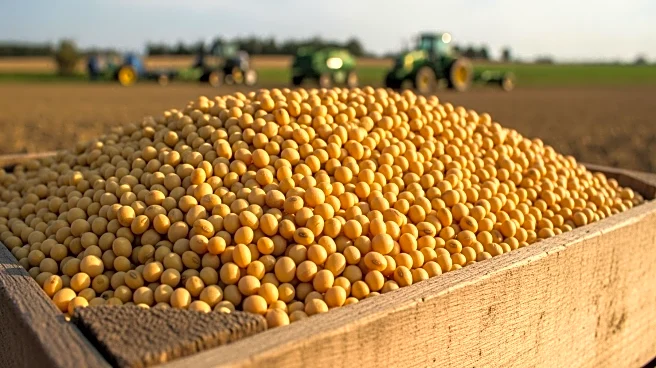What's Happening?
Pennsylvania soybean farmers, like Mike Reskovac, are grappling with the repercussions of trade wars and economic pressures. Following President Trump's imposition of tariffs on China, the country retaliated
by boycotting U.S. soybeans, which previously accounted for about half of America's soybean exports. This has led to a significant drop in soybean prices, which had peaked at over $17 a bushel in 2020 but have since fallen to around $10. Farmers are also facing increased costs for machinery, labor, and unpredictable weather conditions affecting crop yields. Reskovac, a first-generation farmer, is experiencing these challenges firsthand as he manages his family farm in Uniontown, Pennsylvania.
Why It's Important?
The situation highlights the vulnerability of American farmers to international trade policies and economic fluctuations. The drop in soybean prices and increased operational costs threaten the viability of small family farms, which are crucial to the U.S. agricultural sector. The potential bailout being considered by the Trump administration may provide temporary relief, but farmers like Reskovac emphasize the need for long-term solutions to stabilize the industry. The broader impact extends to the agricultural supply chain and rural economies that depend on farming as a primary source of income.
What's Next?
As the trade tensions with China continue, the U.S. government is reportedly preparing a bailout to support affected farmers. However, the effectiveness of such measures remains uncertain. Farmers are looking for sustainable improvements in trade relations and market conditions to ensure their survival. Additionally, diversification of crops and income sources, such as agritourism, may become increasingly important for farmers to mitigate risks associated with market volatility.
Beyond the Headlines
The challenges faced by soybean farmers also raise questions about the sustainability of current agricultural practices and the need for policy reforms. The reliance on international markets for exports exposes farmers to geopolitical risks, suggesting a potential shift towards more localized and resilient agricultural systems. Furthermore, the economic pressures on farmers underscore the importance of addressing broader issues such as climate change and technological advancements in agriculture.









